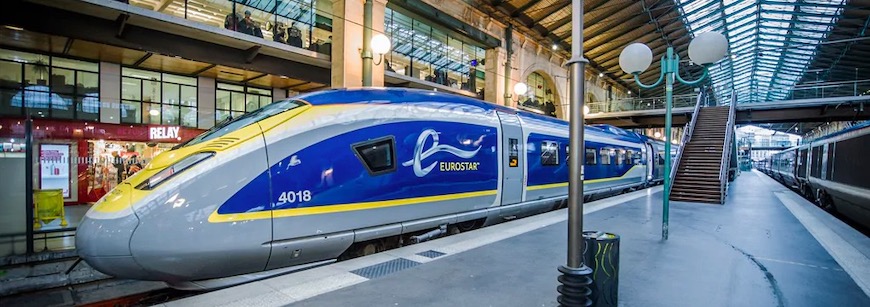Eurostar Unveils Plan to Cut Carbon Emissions and Reduce Waste
Eurostar, the high speed rail service linking the UK with mainland Europe, has unveiled an ambitious 10 point plan in support of its Tread Lightly environmental commitments and in line with the 2016 Paris Climate Agreement and the Science Based Targets Initiative.

These new far-reaching targets build on the achievements of the last eight years during which time Eurostar has achieved a 32% reduction in carbon emissions and a 50% cut in waste across its business.
High Speed Rail Emits up to 90% Less Carbon Than Flying
The environmental benefits of travelling by high speed rail versus plane are significant. A Eurostar journey from London to Paris emits 90% less greenhouse gas than the equivalent short haul flight and produces less carbon per passenger than a single car journey from central London to Heathrow Airport3.
With over 4 million passengers travelling by air between London and Amsterdam every year, Eurostar’s upcoming service from the UK to the Netherlands reinforces high speed rail as the most environmentally responsible choice for short haul travel.
A Eurostar journey from London to Amsterdam results in 80% less carbon per passenger than a flight with the new high speed rail service transporting the equivalent of eight flights per day, over 50 flights per week and over 2,600 flights per year4.
Targeting A 50% Reduction in Plastics By 2020
Reducing waste is central to Eurostar’s Tread Lightly programme which is focused on minimising waste on board and identifying innovative alternatives to traditional packaging. Over the next three years, Eurostar has committed to halving its consumption of plastics and usage of paper tickets.
This drive to remove plastics has been launched with the elimination of plastic straws onboard Eurostar trains and in its business lounges which is the first in a series of planned initiatives.
Supporting Communities
As a high speed rail operator travelling across the UK, France and Belgium, Eurostar has worked hard to ensure that it does not simply travel through, but actively engages with, its communities.
From its innovative Homework Club providing young people in the King’s Cross area with a quiet space for after-school study in its offices, to its work experience programme, its language skills support and its longstanding apprenticeship scheme, Eurostar is constantly finding valuable ways of supporting young people in the local area.
Nicolas Petrovic continued:
“As a business working across a range of destinations we have always had a strong sense of responsibility to our environment and the communities in which we operate. We value the relationships we have forged with local schools and are committed to building on our commitments over the coming years”.
Eurostar’s Tread Lightly 10 Point Plan
Energy efficiency
We will make a reduction of 5% of train energy by 2020. Train energy represents the majority of the power we take from the national grids to operate our trains.
We will reduce traction energy by using energy meters on-board our e320 trains and delivering an energy efficient driving programme to all our train drivers by 2020.
We will introduce alternatives to fossil fuel energy for all train journeys across our markets by 2030.
We will invest in renewable energy at our UK depot, our biggest industrial facility with a substantial footprint, by installing banks of solar panels.
At our stations, we will continue to prevent waste from going to landfill and will work with our partner railways to achieve more segregation of waste and increase rates of recycling.
Reducing plastic and waste
We are committed to reducing waste on board, working with our catering suppliers to reduce waste at source and using best industry practice to find innovative alternatives to traditional packaging.
We have set up a working group focused on reducing the usage of “plastic” with the clear remit of finding new alternatives to plastic. Our aim is to reduce our consumption of plastic by 50% by 2020.
Over the last ten years we have significantly reduced the amount of paper we use by thousands of tons. Using digital technology we aim to eliminate paper ticketing with a reduction of 50% by 2020.
Commitment to sustainability
We are committed to exchanging all the vehicles we own for electric alternatives by 2020. In the meantime, we will work with our supplier to accelerate the switch of its vehicles, electric refrigerated HGVs in particular.
We are determined to improve our sustainable food credentials further by up-grading our 2-star rating from the Sustainable Restaurant Association for our onboard and business lounge food and drink to a 3-star rating by 2020.

